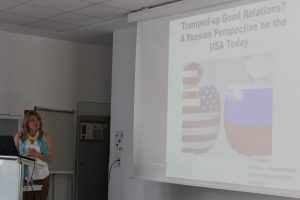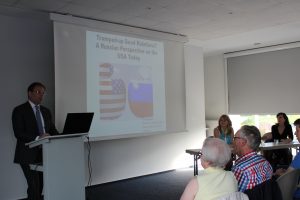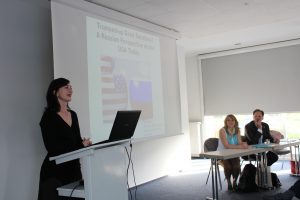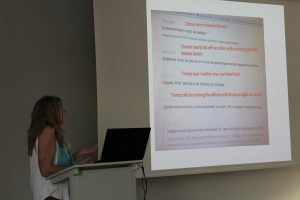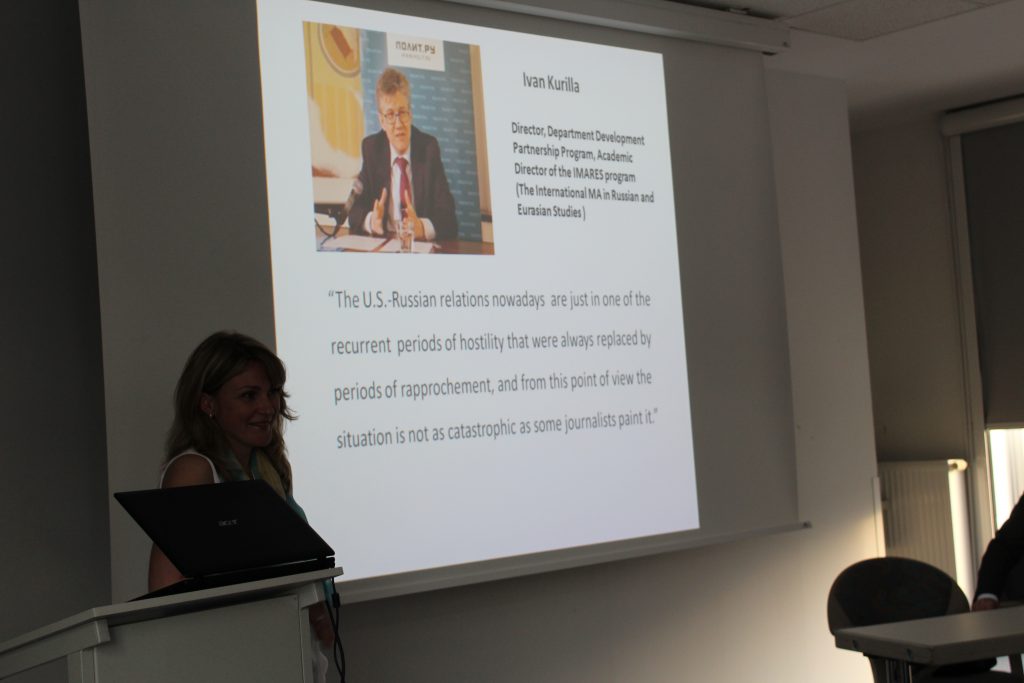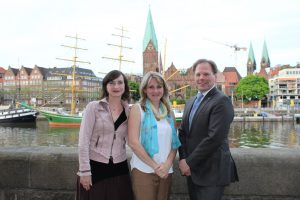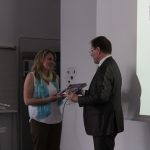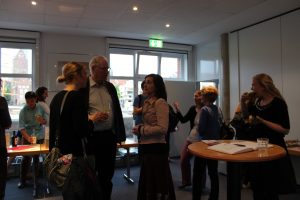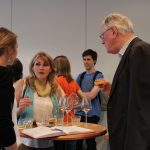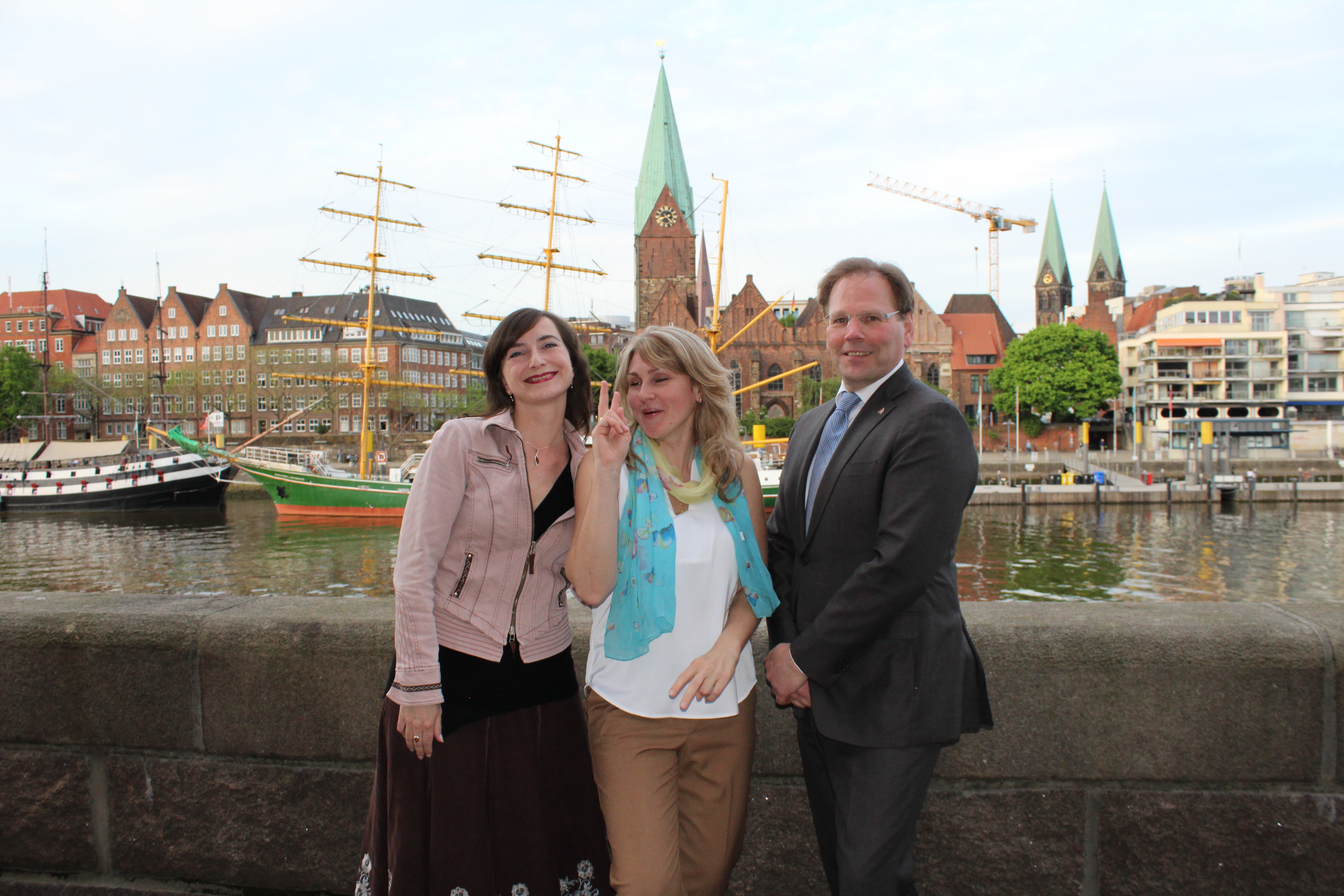On May 15, 2017, the Carl Schurz German-American Club Bremen and Dickinson College invited members of the University of Bremen and citizens to the Fourth Dickinson College Public Lecture on:
“Trumped-up Good Relations? – A Russian Perspective on the USA Today”
with Dr. Irina Filippova
When Donald Trump was elected as the 45th President of the United States of America on November 8th, 2016, many were shocked – but others may have harbored faint hopes as well. Since Trump had already announced his intention to improve American relations with the Russian Federation, many Russian citizens might have expected a new thaw between the two nuclear powers. But events of the last few months have left an ambivalent impression: Amid allegations that Russia attempted to influence the US presidential election, President Trump’s team is also under attack from his own party for its members’ relationships with Russian contacts and for his recent air strike in Syria.
This raises the question of what Russians think of and expect from the USA right now. And more importantly, will future generations be able to improve relations? Irina Filippova, Director of the Dickinson-in-Russia Program at the Russian State University for the Humanities in Moscow (RGGU), provided us with some answers. She had collected statements from colleagues at the RGGU, from the press, from Muscovites, and from Dickinson students currently studying in Moscow. Rather than presenting a political analysis of what can only be described as an uncertain status quo, she gave us a first-hand insight into public opinion in Russia, and the mindset and sentiments of so-called “ordinary people” there.
 First, she offered a brief overview of the checkered history of Russian-American relations from the 16th century to today. It started with a meeting of Russian Tsar Peter the Great and William Penn – the founder of the Pennsylvania Colony – as a first diplomatic meeting of the two countries in 1698. From the selling of Alaska in 1867 to the Russian revolution in 1917, to being allies in World War II and enemies in the Cold War to the recent Russian transgressions in Crimea and the Donbas in Ukraine, the relations between the countries have currently overall deteriorated.
First, she offered a brief overview of the checkered history of Russian-American relations from the 16th century to today. It started with a meeting of Russian Tsar Peter the Great and William Penn – the founder of the Pennsylvania Colony – as a first diplomatic meeting of the two countries in 1698. From the selling of Alaska in 1867 to the Russian revolution in 1917, to being allies in World War II and enemies in the Cold War to the recent Russian transgressions in Crimea and the Donbas in Ukraine, the relations between the countries have currently overall deteriorated.
 Dr. Filippova introduced different Russian polling agencies and showed several polls from October 2016 to April 2017 – that clearly indicated how there were some hopes for an improvement in political relations and some support for Donald Trump, but how those have decreased dramatically within those 6 months. Filippova complemented this development with translated headlines from Russian newspapers and pointed cartoons. She rounded up her findings with statements from academics from RGGU. Her personal poll among Russian students and Muscovites of ages around 40 showed that, unfortunately, the younger people seemed generally less interested in politics than the older ones and that both groups have come to rather pessimistic views on the future relations between the United States and Russia.
Dr. Filippova introduced different Russian polling agencies and showed several polls from October 2016 to April 2017 – that clearly indicated how there were some hopes for an improvement in political relations and some support for Donald Trump, but how those have decreased dramatically within those 6 months. Filippova complemented this development with translated headlines from Russian newspapers and pointed cartoons. She rounded up her findings with statements from academics from RGGU. Her personal poll among Russian students and Muscovites of ages around 40 showed that, unfortunately, the younger people seemed generally less interested in politics than the older ones and that both groups have come to rather pessimistic views on the future relations between the United States and Russia.
 However, our Dickinson students currently studying in the Moscow program explained how important it is to them, besides all clear differences, to engage in discourse and to be confronted with opposing views from Russian students. Those Dickinson students believe in the importance of intensive study abroad programs as Dickinson offers them – they keep communication alive against all odds and train future competent global citizens who hopefully manage to improve political situations in the future.
However, our Dickinson students currently studying in the Moscow program explained how important it is to them, besides all clear differences, to engage in discourse and to be confronted with opposing views from Russian students. Those Dickinson students believe in the importance of intensive study abroad programs as Dickinson offers them – they keep communication alive against all odds and train future competent global citizens who hopefully manage to improve political situations in the future.

